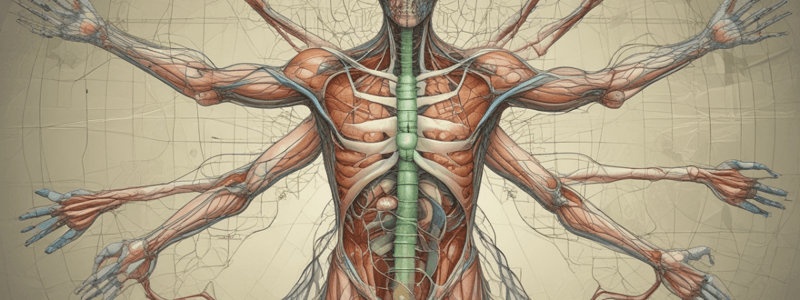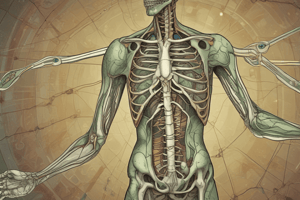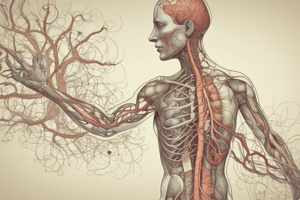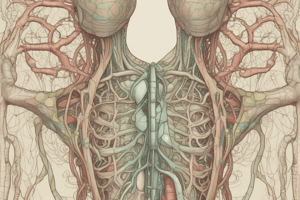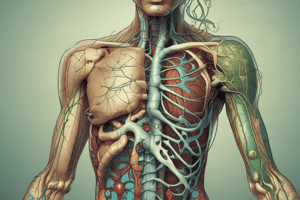Podcast
Questions and Answers
What percentage of the body is made up of water and other fluids?
What percentage of the body is made up of water and other fluids?
- 70%
- 80%
- 40%
- 60% (correct)
What is the main function of lymph capillaries?
What is the main function of lymph capillaries?
- To remove bacteria from the lymph fluid
- To produce white blood cells
- To pick up leaked fluids (correct)
- To dump fluid into large veins
What happens to the lymph fluid as it passes through lymph nodes?
What happens to the lymph fluid as it passes through lymph nodes?
- It is filtered to remove good cells
- It is stored for later use
- It is cleaned of bacteria and bad cells (correct)
- It is mixed with blood
Why do lymph nodes sometimes swell?
Why do lymph nodes sometimes swell?
What is the final destination of the lymph fluid after it travels through the lymph vessels?
What is the final destination of the lymph fluid after it travels through the lymph vessels?
What is the function of the tonsils?
What is the function of the tonsils?
What is unique about the spleen?
What is unique about the spleen?
What happens to the thymus gland after puberty?
What happens to the thymus gland after puberty?
Where are the tonsils located?
Where are the tonsils located?
What is the spleen responsible for making?
What is the spleen responsible for making?
Flashcards are hidden until you start studying
Study Notes
Lymphatic System
- The lymphatic system is a network of vessels and body parts that collect fluids that leak out of cells and blood, comprising more than 60% of the body.
- The system sweeps up leaked fluid and returns it to the bloodstream, preventing fluid buildup in body tissues.
How It Works
- The lymphatic system consists of lymph vessels, lymph nodes, and organs.
- Lymph capillaries act as "little vacuum cleaners" to pick up leaked fluids and pass them along to lymph vessels.
- Lymph vessels travel towards the neck, dumping fluid into large veins to return it to the bloodstream.
Lymph Nodes
- Lymph nodes are small, bean-shaped collections of tissue that remove bacteria and bad cells from lymph fluid.
- They also produce white blood cells and antibodies to fight disease-causing cells.
- There are hundreds of lymph nodes in the body, found in clusters in the thighs, armpits, and neck.
- Swollen lymph nodes can indicate the body is fighting an infection.
Lymph Organs
Tonsils
- Tonsils are lymph organs that defend against bacteria and viruses entering through the nose or mouth.
- They are found on the sides of the mouth, towards the back.
Spleen
- The spleen is the largest lymph organ in the body, filtering blood to remove bacteria and harmful cells.
- It recycles broken down red blood cells into new cells and produces some white blood cells.
Thymus Gland
- The thymus gland is a lymph organ that helps develop the immune system in early life.
- It stores immature white blood cells that grow into infection fighters, but becomes less important after puberty.
Studying That Suits You
Use AI to generate personalized quizzes and flashcards to suit your learning preferences.
